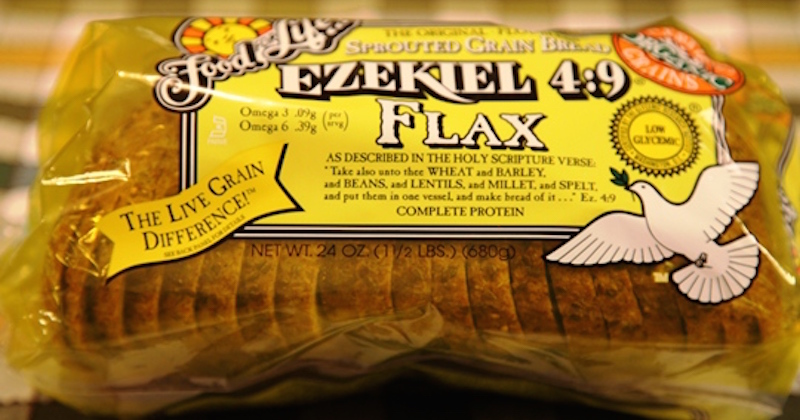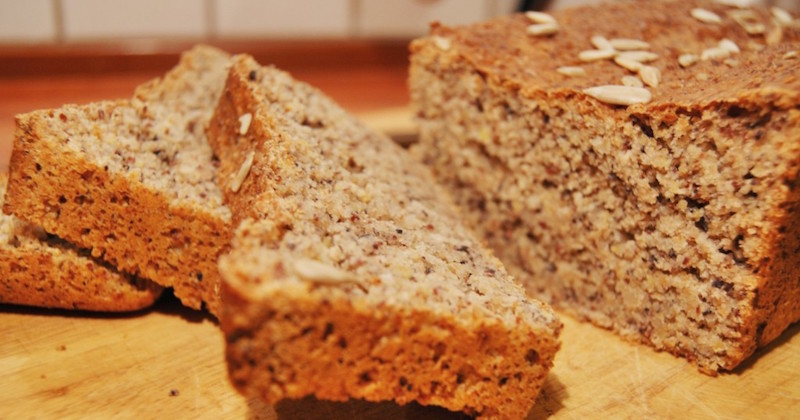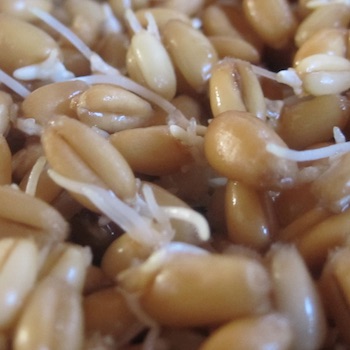Why Ezekiel Bread is The Healthiest Bread You Can Eat
Last updated on
Several people have asked me about Ezekiel bread, which is different from most other types of bread.
Awareness of the harmful effects of wheat has increased quite a bit in the past few years. Given that wheat is a large part of most people’s diets, many are looking for healthy alternatives.
Ezekiel 4:9: “Take wheat and barley, beans and lentils, millet and spelt; put them in a storage jar and use them to make bread for yourself.”
What is Ezekiel Bread?
Ezekiel bread is different for several reasons.
Whereas most breads contain added sugar, Ezekiel bread contains none. It is also made from organic, sprouted whole grains. The sprouting process changes the nutrient composition of the grains significantly.
In contrast to most commercial breads, which consist primarily of refined wheat or pulverized whole wheat, Ezekiel bread contains several different types of grains and legumes:
- 4 types of cereal grains: Wheat, Millet, Barley and Spelt.
- 2 types of legumes: Soybeans and Lentils.
All the grains and all the legumes are organically grown and allowed to sprout before they are processed, mixed together and baked to produce the final product.
I’d like to point out that wheat, barley and spelt all contain gluten, so Ezekiel bread is out of the question for people with celiac disease or gluten sensitivity.
What Does Sprouting Do?
Even though grains like wheat or corn look pretty boring, these tiny seeds contain enormously complex molecular machinery. There are genes, proteins and enzymes that can turn that tiny seed into an entire plant.
When the grain receives the right “signals” – a complex biochemical process begins. The seed starts germinating, breaks through the shell and sends tangles called sprouts into the earth. With enough water and nutrients in the soil, eventually this tiny seed turns into a plant.
A sprouted seed is a seed that has been allowed to begin the process. It is somewhere between being a seed and a full-fledged plant. But, there’s one thing that we need to keep in mind here… the seed does NOT want to sprout in an unfriendly environment.
For example, if it started sprouting when the earth is completely dry, then it wouldn’t be able to turn into a plant and would end up dying.
For this reason, seeds have protective mechanisms called enzyme inhibitors that prevent them from sprouting until the time is right.
By giving the seed the right signals, mainly hydration (water) and the right temperature, we can disable these enzyme inhibitors and make the seed start to sprout.
Grains And Legumes Contain Anti-Nutrients
There’s another important thing to keep in mind here… most organisms don’t want to be eaten. Grains and legumes are no exception. They need to survive in order for them to get their genes to the next generation.
Certain plants have developed so-called anti-nutrients in order to discourage animals from consuming them. These are substances that can prevent the absorption of nutrients, inhibit digestive enzymes and have various negative effects on health.
One example is soybeans… due to enzyme inhibitors, they are toxic when raw. Even though most grains and legumes are edible after being cooked, cooking doesn’t eliminate all the anti-nutrients.
Many non-industrial populations throughout the world have eaten grains without problems, but most of them used traditional preparation methods like soaking, sprouting, fermenting and cooking to significantly reduce the amount of anti-nutrients in them.
Are Sprouted Grains Healthier?
Sprouting, as in soaking the grains in water and allowing them to germinate, causes a number of biochemical reactions in the grain.
The benefits of this are twofold:
- Sprouting increases the amount of healthy nutrients.
- Sprouting reduces the amount of harmful anti-nutrients.
How Sprouting Increases Nutrients
Due to the sprouting process, Ezekiel bread may contain more of some vital nutrients. Some studies show that sprouting grains increases their content of the amino acid lysine (1).
Lysine is the limiting amino acid in many plants, so sprouting increases the efficiency that the proteins in the grain can be used for structural and functional purposes in the human body.
Also, combining the grains (wheat, millet, barley and spelt) with the legumes (soybeans and lentils) may increase the protein quality somewhat (2).
Studies also show that sprouting wheat may lead to significant increases in soluble fiber, folate, Vitamin C, Vitamin E and Beta-Carotene (3, 4).
Sprouting also partially breaks down the starch, because the seed uses the energy in the starch to fuel the sprouting process. For this reason, sprouted grains have slightly less carbohydrate (5).
So… due to the sprouting of the seeds, Ezekiel bread should definitely be more nutritious than most other types of bread.
How Sprouting Decreases Anti-Nutrients
Sprouted grains also have lower amounts of anti-nutrients, which are substances that inhibit the absorption of nutrients like minerals and can cause harm.
- Phytic Acid is a substance found in grains and many other foods. It can bind minerals like Zinc, Calcium, Magnesium and Iron and prevent them from being absorbed. Sprouting modestly reduces phytic acid (6).
- Enzyme inhibitors are present in seeds, which protect them from spontaneously germinating but may also make the nutrients in them harder to access. Sprouting inactivates some of them (7, 8).
Another benefit of sprouting is that it reduces the amount of gluten, a protein that many people are sensitive to and is found in wheat, spelt, rye and barley (3).
Due to the reduction in anti-nutrients, Ezekiel bread may be easier to digest and the nutrients in it are more accessible to the body.
Wheat Is Still Associated With a Number of Health Issues
It’s important to keep in mind that despite being organic,wheat is still the number one ingredient in Ezekiel Bread.
This is a problem because modern wheat is associated with a number of health issues.
To make a long story short, wheat:
- Contains gluten, which many people are sensitive to and can contribute to digestive issues, increased gut permeability, etc (9, 10).
- Wheat consumption has been linked to some cases of cerebellar ataxia, schizophrenia and autism in controlled trials, indicating that wheat gluten may contribute to these diseases in some individuals (11, 12, 13).
- The fiber in wheat may contribute to a Vitamin D deficiency by making the body burn through its Vitamin D stores much faster (14).
- One controlled trial shows that whole wheat (yes, the “heart-healthy” kind) can increase Total cholesterol, LDL, small, dense LDL and LDL particle count, which should translate to an increased risk of heart disease (15).
Sprouting won’t eliminate these negative health effects, although it may mitigate them somewhat.
If you’re not gluten sensitive and not on a carb restricted diet, then Ezekiel bread can be a healthier choice.
It is certainly a whole lot better than 99% of the breads on store shelves… which are usually made from refined wheat and often contain lots of sugar.
Take Home Message
Ezekiel bread is available in many supermarkets and health food stores, such as Whole Foods. You can also find a way to make your own if you look for “ezekiel bread recipe” on Google.
At the end of the day, Ezekiel bread is still bread. For optimal nutrition, it would probably be better for most people to skip the bread altogether and stick to real foods like animals and plants.
However… if you’re doing your best to eat healthy but aren’t willing to give up bread just yet, then Ezekiel bread is definitely a much healthier choice.
This article was originally published on AuthorityNutrition.com. It is republished here with permission.
Some of the links I post on this site are affiliate links. If you go through them to make a purchase, I will earn a small commission (at no additional cost to you). However, note that I’m recommending these products because of their quality and that I have good experience using them, not because of the commission to be made.
Comments
Leave a Reply













 JOIN OVER
JOIN OVER
Where is Ezakiel bread available? Do any of the larger grocery chains carry your product, or is it limited to health food stores? Thank you!